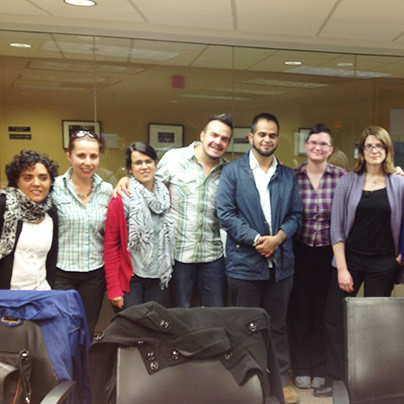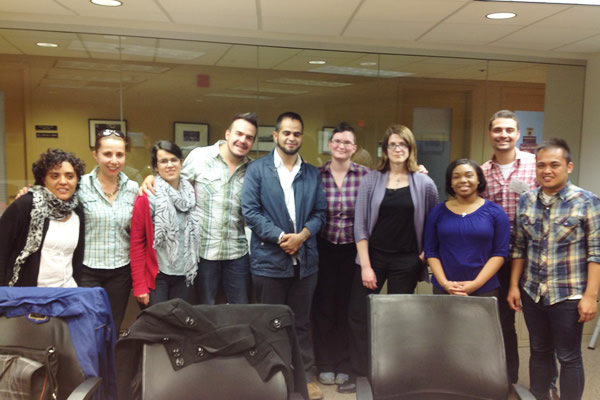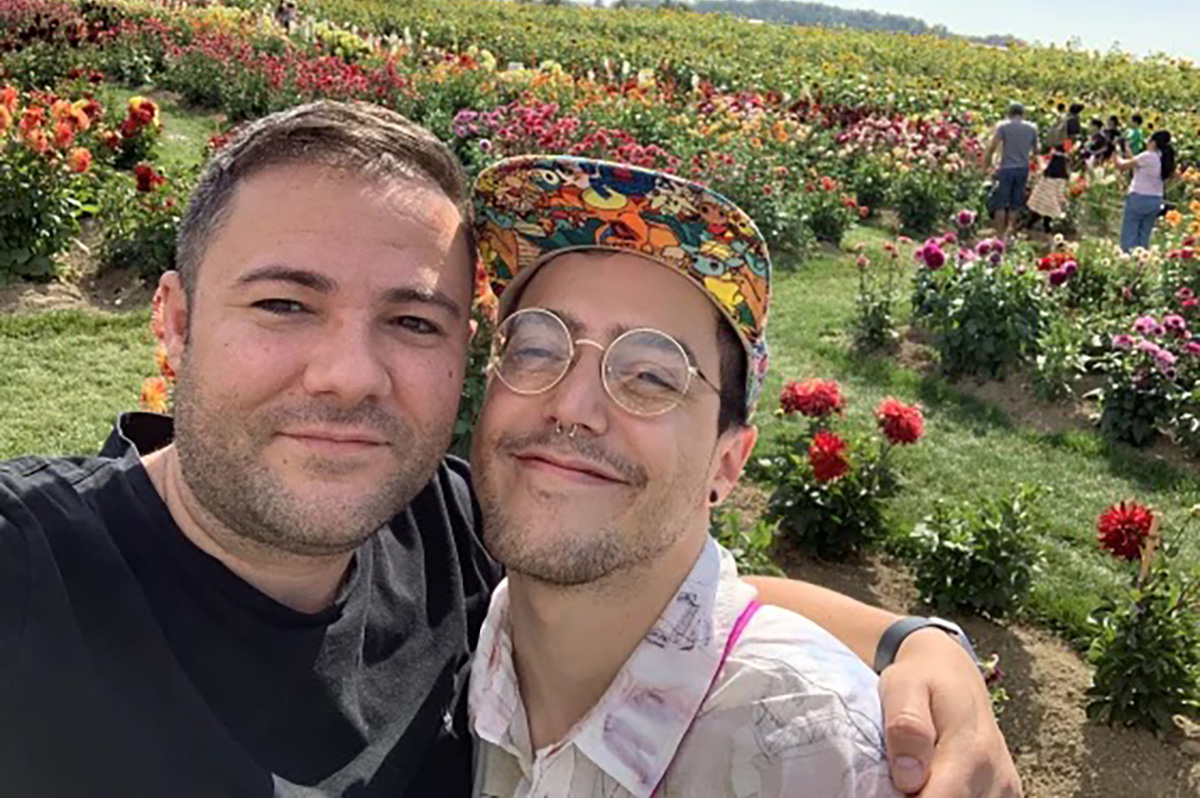World
Colombian LGBT rights advocates visit U.S.
Six activists took part in State Department-sponsored trip


Colombian LGBT rights advocates are in the U.S. on a State Department-sponsored trip. (Photo courtesy of Wilson Castańeda)
Six Colombian LGBT rights advocates have visited D.C. and two other states this month as part of a State Department-sponsored trip to learn how activists, politicians and government officials in this country advance civil and human rights.
The group — which includes lawyer Viviana Baharquez Monsalve; Wilson de Jesús Castañeda Castro, director of Corporación Caribe Afirmativo in Cartagena; Juan Carlos Pietro García, director of the city of Bogotá’s Office of Sexual Diversity and Federico Ruíz Mora of the Santamaría Fundación in Cali — arrived in D.C. on April 14.
The advocates met with State Department officials, Lisa Mottet of the National Gay and Lesbian Task Force, Human Rights Campaign and Victory Fund staffers, transgender activists and others while in the nation’s capital. They will have also traveled to Des Moines, Iowa, and San Diego before returning to Colombia on Wednesday.
Castañeda, whose group advocates on behalf of LGBT Colombians who live along the country’s Caribbean coastline, told the Washington Blade during an April 18 interview that he and his fellow activists highlighted their work on behalf of their gay, lesbian, bisexual and trans countrymen. He said they also wanted to learn about this country’s elections, documentation of hate crimes and anti-bullying efforts in schools while in the United States.
Ruíz, whose group advocates on behalf of trans women, discussed how the Colombian LGBT rights movement compares to that in the United States.
“Things are rather similar to those in our country, but there are clearly obvious differences,” he said.
The activists arrived in the United States less than a month after the U.S. Supreme Court heard oral arguments in two cases that challenge the constitutionality of California’s Proposition 8 and the Defense of Marriage Act. Their trip also coincided with the ongoing debate over a bill that would extend marriage rights to same-sex couples in Colombia.
The Colombian Senate had been scheduled to vote on the proposal on April 18 — the same day the activists spoke with the Blade, but it was postponed until Tuesday. Baharquez said it will prove “very, very difficult” to pass the same-sex marriage bill because of opposition from religious conservatives in the country’s Congress.
“There is little hope that something is going to pass,” she said.
Colombian senators in 2007 defeated a bill that would have allowed gays and lesbians to enter into civil unions.
The country’s Constitutional Court in three separate rulings it issued later that year and in 2008 extended property and inheritance rights, social security and pension benefits to same-sex couples. The tribunal in 2009 issued a ruling that said co-habitating gay and lesbian couples must receive the same rights that unmarried heterosexual couples receive under Colombian law.
The same court in 2011 ruled lawmakers must pass legislation within two years that extends the same benefits that heterosexuals receive through marriage to same-sex couples. If legislators fail to act on this mandate by June 20, gays and lesbians can legally register their unions.
Anti-trans violence remains endemic in Colombia
While attention remains focused on extending marriage rights to same-sex couples, violence against trans women remains rampant throughout the country.
A report from the Latin American and Caribbean Network of Transgender Women (REDLACTRANS) notes 61 trans women in Colombia have been reported murdered between 2005-2011. The group further notes none of the alleged perpetrators have been prosecuted — Ruíz said authorities often exacerbate the problem.
“Colombia is the same as many Latin American countries and others around the world; the trans community is that which is the most affected,” he said as he discussed the issue. “This has to do with historic discrimination and exclusion accompanied by systematic acts of violence. This violence has to do with transphobic acts because of [the victim’s] gender identity.”
The advocates hope to launch a campaign in support of a trans rights bill that would, among other things, “guarantee a dignified life for trans women in Colombia.” Ruíz further described them as those who are “in a helpless situation against the constant violation of their human rights.”
Argentine President Cristina Fernández de Kirchner in May 2012 signed a bill that allows people who have not undergone sex-reassignment surgery to legally change their gender without a doctor or judge’s approval. The law further mandates public and private health insurance plans to cover SRS, hormone therapy and other trans-specific treatments without additional premiums.
Castañeda told the Blade the campaign through which Argentine LGBT rights advocates secured passage of their country’s trans rights bill is “important to us.” He stressed, however, their own effort should take into account the “particularity of the situation” that trans Colombians currently face with regard to discrimination and violence.
Ruíz also responded to the Blade’s question about whether the ongoing same-sex marriage debate has overshadowed the need to extend legal protections based on gender identity and expression.
“It is an advance in the recognition of rights as a group,” he said, while noting some trans women don’t identify much with the issue of nuptials for gays and lesbians. “For the trans organizations, it will be much more important that gender identity is recognized as an identify for the purposes of rights.”
In addition to efforts in support of same-sex marriage and trans rights, the advocates said they will continue to seek LGBT inclusion in the ongoing peace profess between the Colombian government and armed rebels. They also hope to have a greater presence in the country’s political system.
The U.S. Agency for International Development earlier this month announced a public-private partnership designed to promote LGBT rights around the world. The Victory Institute and the Astraea Foundation will conduct the initiative’s first training in Bogotá, the Colombian capital, from May 30-June 2.
Bogotá City Councilor Angelica Lozano; Blanca Durán, mayor of the Colombian capital’s Chapinero district and Tatiana Piñeros, a trans woman whom Bogotá Mayor Gustavo Petro appointed last year to run the city’s social welfare agency are among those expected to attend.
“For those of us who have come to the United States, we identified and built upon best practices to know and use in our daily work,” Prieto said.
Mexico
Gay couple claims Puerto Vallarta wedding venue discriminated against them
Jeremy Alexander and Ryan Sheepwash wanted to get married at Sheraton hotel

A gay couple claims a hotel in a Mexican resort city that is popular with LGBTQ travelers discriminated against them when they tried to book their wedding.
Jeremy Alexander and Ryan Sheepwash in a TikTok video said they contacted the Sheraton Buganvilias Resort and Convention Center in Puerto Vallarta about holding their wedding at the property.
The couple, who live in Vernon, British Columbia, provided the Washington Blade with an invoice that Gabriela Espinoza, a wedding planner at the property, sent them on Jan. 17, 2025.
The invoice said 25 “deluxe ocean view room — all inclusive” rooms cost $970 a night. The total cost for the 25 rooms was $72,750.
Alexander in the TikTok video said it took Espinoza three months to send them the quote. The property, according to Alexander, requested a $36,000 deposit for half of the rooms.
“It’s not reasonable,” he said. “No one can afford that.”
Alexander said Espinoza told him and Sheepwash that the earliest they could have their wedding at the property was March 2027. Alexander in the TikTok video said he and Sheepwash asked a straight friend to “request a quote just to see apples to apples what it looks like.”
Ximena Esparza, another wedding planner at the property, on Feb. 7, 2025, sent the friend a quote for 25 rooms for a hypothetical wedding that was to have taken place from Feb. 19-26, 2026.
The quote for a “deluxe package” for 50 people was $8,500 and required a 20 percent deposit of $1,700.
“We just feel defeated,” said Sheepwash in the TikTok video. “It’s not fair because we love each other and we really want to get married, and we want to make it special and we want to make it perfect.”
@illuminaughtytriangle So disappointed that my fiancée and I got discriminated against by #Sheraton in #puertovallarta ♬ original sound – Jeremy Alexander
The Blade in 2019 reported the Sheraton Buganvilias Resort and Convention Center refused to allow Josh Rimer, a gay Canadian vlogger and television host who is also Mr. Gay Canada 2019, and his then-fiancé to hold their wedding at the property.
The invoice that Espinoza sent to Alexander and Sheepwash notes the hotel is “operated under license from Marriott International, Inc., or one of its affiliates.”
A spokesperson for Marriott, which is based in Bethesda, Md., and is Sheraton’s parent company, in response to Rimer’s allegation said the corporation reached out to him to express “our sincerest apologies for his experience.”
“We are troubled and greatly concerned about the experience reported by Mr. Rimer. Marriott has long been committed to providing an environment where all are welcome including our LGBTQ guests and their loved ones,” said the spokesperson. “In addition, we are looking further into the matter to better understand what happened and do what we can to prevent hurtful experiences like this from happening again.”
A Marriot spokesperson on Thursday told the Blade the company has “reached out to Mr. Sheepwash and Mr. Alexander to learn more about their experience and are working with the property to offer a solution.”
“The Sheraton Buganvilias has been active in the LGBTQ+ community in Puerto Vallarta for years, hosting LGBTQ+ weddings and groups and also supporting Pride events in Puerto Vallarta,” said the spokesperson. “Marriott remains steadfast in our commitment to ensure guests are treated with respect and understanding.”
Chile
Transgender woman sues Chilean national police
Isabella Panes alleges she suffered harassment, exclusion after becoming ‘carabinera’

Isabella Panes in 2022 was celebrated as a symbol of inclusion.
Wearing an olive green uniform and a shy smile, she appeared in the media and on social media as Chile’s first trans female “carabinera” or national police officer. The Carabineros promoted Panes as a sign of openness, but that story has become a dramatic case of institutional discrimination.
Panes today faces the Carabineros in court.
She has denounced a series of systematic acts of exclusion, harassment at work, and violation of fundamental rights that she and her defense team maintains pushed her into a mental health crisis that almost cost her her life.
“My hope is that tomorrow we will be able to live in a world of equality for all. Just that we understand that we are human beings and we have to make life a lot easier for each other,” Panes told the Washington Blade during an exclusive interview.
Panes, 29, grew up in Laja in the Biobío region.
She dreamed of becoming a “carabinera” since she was a child, despite the fact that she faced discrimination because of her gender identity. After years of effort, surgeries and a difficult transition, Panes enrolled in the Carabineros Academy in 2021.
Panes faced the challenge of making her medical processes compatible with the physical demands of training. Even so, she graduated with good marks, and was recognized as part of the new institutional image the Carabineros wanted to project after the 2021 social unrest tarnished their image.
This institutional support disappeared after the media campaign.
Panes alleges she was marginalized from operational duties and relegated to administrative tasks, despite her interest in and training to patrol the streets like any other officers.
“I joined the Carabineros to serve, not to be a marketing decoration,” she said. “I was offered to be part of the change, but only if I kept quiet and accepted the mistreatment.”
The accusations against the Carabineros are serious: Constant mockery by colleagues, dissemination of private information about her personal life, invasive questions about her body and sexual orientation. Panes’s legal representatives said this abuse took place within a context where the institution did not take effective measures to protect their client.
The Carabineros Social Security Administration, known by the Spanish acronym Dipreca, also refused to cover her transition-related medical procedures, arguing they were “aesthetic,” despite medical reports that indicated their importance for Panes’s mental health and well-being.
Panes in January attempted to kill herself by suicide. She managed to survive after calling Chile’s 4141 mental health care number for help.
“They were killing me slowly, from the inside,” said Panes.
Panes has brought her case to the Supreme Court after a lower court ruled in favor of Dipreca’s decision to not cover her medical treatments.
Her legal team in a lawsuit has also accused the Carabineros of employment and systematic discrimination. Panes is seeking damages and institutional reforms.
“The Carabineros used Isabella to clean up its public image, but when it came to guaranteeing real rights, they abandoned her,” said Javiera Zúñiga, spokesperson for the Movement for Homosexual Integration and Liberation, a Chilean advocacy group.
“It is not enough to show up at the Pride march,” she added. “True inclusion is demonstrated in deeds, in daily dealings, in respect for the dignity of all people.”
Panes’s case starkly exposes the limits of diversity policies when there is no deep institutional commitment to implement them.
“I am no longer afraid,” said Panes, ”What happened to me cannot happen again. Not for me, but for all those who come after me.”
Brazil
US lists transgender Brazilian congresswoman’s gender as ‘male’ on visa
Erika Hilton has represented São Paulo since 2022

A transgender Brazilian congresswoman says the U.S. issued her a visa that listed her gender as “male.”
Erika Hilton on Wednesday wrote on her Instagram page that she requested a visa that would have allowed her to travel to the U.S. in order to participate in the Brazil Conference at Harvard University and the Massachusetts Institute of Technology.
The conference took place earlier this month.
“I was classified as ‘male’ by the U.S. government when I went to get my visa,” wrote Hilton, who added a visa she received from the U.S. in 2023 listed her gender as “female.”
Hilton is a Black travesti and former sex worker from São Paulo who won a seat in the Brazilian Congress in 2022. The Washington Blade spoke with Hilton shortly after her election.
“It is a big responsibility … but I feel very honored,” said Hilton. “I very much like to be able to be a representative for my people, and the more than 250,000 people who voted for me have confidence in me,” she said after she spoke at a rally in support of now Brazilian President Luiz Inácio Lula da Silva in a São Paulo square. “This demonstrates that our work has the potential to have a gigantic reach; where we can advance efforts to end death, poverty, misery, genocide that we have.”
President Donald Trump in his inaugural speech announced the federal government’s “official policy” is “there are only two genders, male and female.” The Trump-Vance administration has also banned the State Department from issuing passports with “X” gender markers.
Germany and Denmark are among the countries that have issued travel advisories for trans and nonbinary people who plan to visit the U.S. These warnings come ahead of WorldPride, which is scheduled to take place in D.C. from May 17-June 8.
Hilton said she is “not surprised” the U.S. issued her a visa with a male gender marker.
“I’m also not surprised by the level of hatred and fixation these people have with trans people,” she said. “After all, the documents I presented are rectified, and I’m registered as a woman, even on my birth certificate.”
Hilton further accused the U.S. of “ignoring official documents from other sovereign nations, even from a diplomatic representative.”
“At the end of the day, I’m a Brazilian citizen, and my rights are guaranteed and my existence is respected by our own constitution, legislation, and jurisprudence,” she said.
Editor’s note: Duda Salabert, another transgender Brazilian congresswoman, also said the U.S. listed her gender as “male” on her American visa.
-

 El Salvador4 days ago
El Salvador4 days agoGay Venezuelan makeup artist remains in El Salvador mega prison
-

 State Department3 days ago
State Department3 days agoHIV/AIDS activists protest at State Department, demand full PEPFAR funding restoration
-

 Opinions5 days ago
Opinions5 days agoScience must not be a weapon against trans people
-

 Maryland5 days ago
Maryland5 days agoMd. schools plan to comply with federal DEI demands








